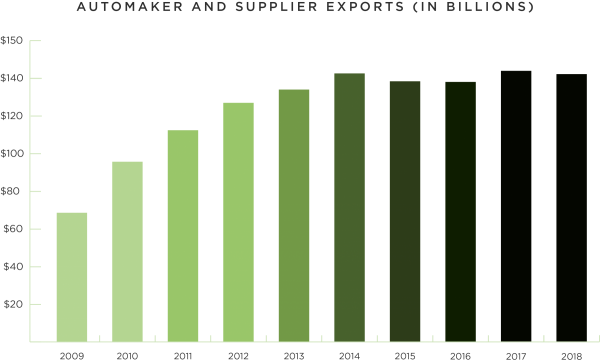The automotive sector represents the nation’s No. 1 export industry and is responsible for driving job creation and economic growth across the country. The U.S. automotive sector has seen its exports rise by 76% since 2009.
Each year, Ford, General Motors, and Stellantis export about 1 million American-made vehicles to more than 100 different foreign markets. This is further evidence of the economic significance of U.S. exports to job creation.
Increased exports have far reaching impacts on the economy overall. Ford, General Motors and Stellantis produce more of their vehicles, buy more of their parts, conduct more of their research and base more of their workers in the United States than their competitors. These differences represent billions of dollars in investment and purchases, representing millions of American jobs.
Automaker and Supplier Exports (in billions)

The U.S. automotive sector has seen its exports rise by 76% since 2009.
-
Trade Treaty Concerns Surface
A proposed international trade treaty involving Pacific nations including Japan could threaten the domestic auto recovery here and in other industrial Midwestern states if it isn't smartly negotiated, the Big Three U.S. auto companies and Ohio senators Rob Portman and Sherrod Brown said.
-
Jobs in Michigan require a level playing field for trade
The city of Detroit has temporarily tapped out. In this case, municipal bankruptcy is more than just relief from debt obligations; it represents a huge psychic wound for the heart of American industry. Michigan makes things. So how could it have gotten this rough?
It’s bad, but there is hope. The Big Three, only a few years out of their deathbeds, are back in the black. GM, Ford, and Chrysler have produced profits that measure in the billions, despite the prewritten obituaries that appeared in 2009.
Despite their turnaround, the Big Three still face significant hurdles in getting their goods into Japan, and face import competition subsidized by currency manipulation. In fact, imports from all countries, including the U.S., account for only 6 percent of Japan’s auto market. Meanwhile, America has one of the most open auto markets in the world.
-
Rep. Levin details tougher trade requirements for Japan
A senior House Democrat wants Japan to earn any further reductions on auto tariffs by opening up its market to U.S. auto imports.
House Ways and Means Committee ranking member Sandy Levin (Mich.) called for a "new and more assertive approach to the problem" of solving Japan's longstanding restrictions on imports of foreign cars.
"Negotiations to open the Japanese auto market have repeatedly and totally failed in the past," he said Tuesday during a trade event at the Peterson Institute.
-
U.S. lawmaker seeks tough rules on Japan autos in trade talks
A senior U.S. lawmaker on Tuesday urged the Obama administration to push for tough rules on opening the U.S. market to more Japanese autos and to take a firm line in free trade talks against currency manipulation, as Detroit automakers and workers turned up the heat on the White House.
The demand from Representative Sander Levin, the top Democrat on the House of Representatives Ways and Means Committee, highlighted the difficulty President Barack Obama may face in getting the proposed Trans-Pacific Partnership pact through Congress, unless he responds to concerns about the agreement among many of his own party members.
-
80,000 U.S. auto workers back tough line with Japan
More than 80,000 hourly and salaried U.S. auto workers signed a petition urging Congress to oppose approving a free-trade deal including Japan without significant changes on auto policy and currency by the world’s third-largest economy.
The petitions arriving at Capitol Hill offices Tuesday from employees at General Motors Co., Ford Motor Co. and Chrysler Group LLC strongly urge Congress to oppose completing the Trans-Pacific Partnership with Japan unless currency manipulation and non-tariff barriers are addressed.



